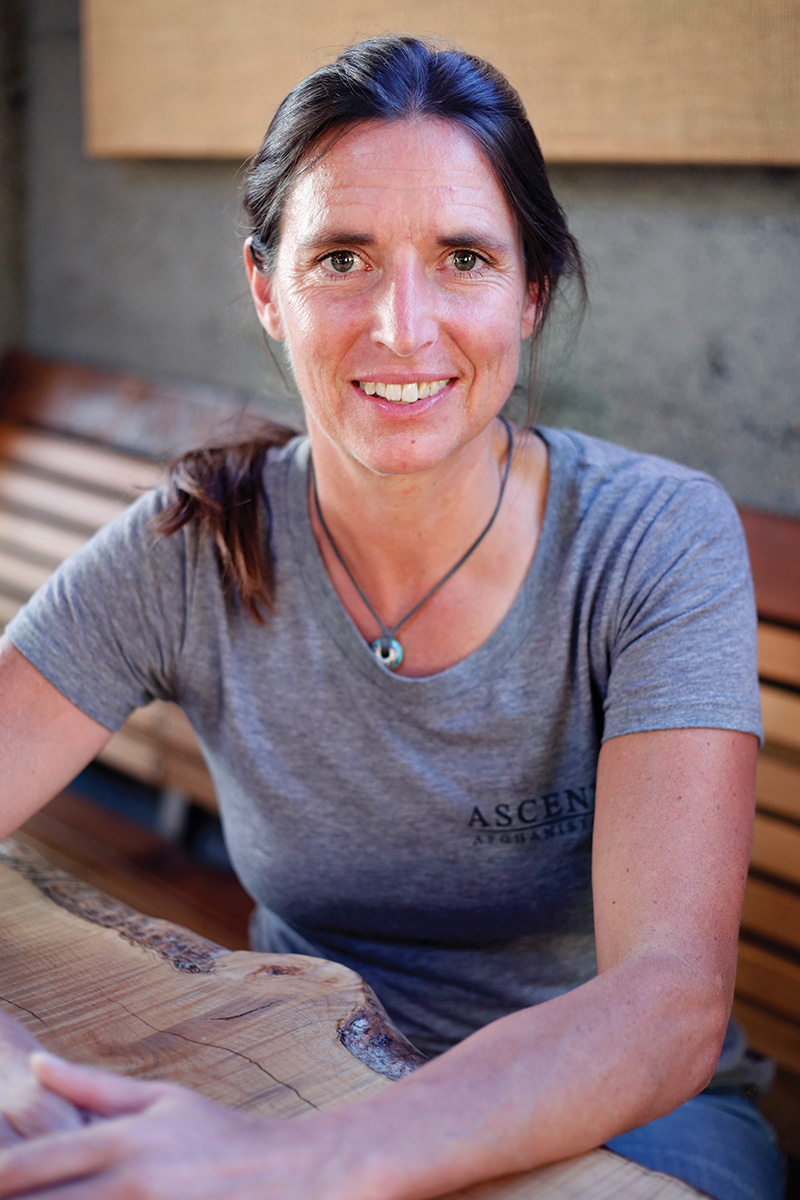
Danika Gilbert '94 planned the climbs on Google Earth.
An experienced climber and guide, the Pacific University alumna was nonetheless inexperienced when it came to the peaks of Afghanistan. And she had little chance to explore before guiding 13 girls into the high country in August 2015.
Gilbert had spent months working with the nongovernmental agency Ascend: Leadership Through Athletics. She spent the month of May in Afghanistan, working with the inaugural class of Ascend participants: 13 young Afghan women of diverse backgrounds, all poised to defy stereotype — and the current political climate — by climbing the highest peak in the country.

When she returned in August for the expedition, though, the circumstances had changed.
“Two weeks prior to leaving, the security situation deteriorated, so we had to re-route and pick a new location,” Gilbert said.
“I flew over it, but I hadn’t had the chance to get on the ground there yet. It was an interesting challenge, but it worked well.”
In the end, they climbed a series of peaks in the country’s Panjshir Valley, one at 16,500 feet, marking the highest summit ever made by Afghan women.
“This is really the most freedom these girls have ever had,” Gilbert said. “(But) mountaineering is just a venue to help the girls learn leadership. My focus and concern was on the emotional development of the girls, as well as being able to climb the peak.”
Gilbert grew up in Colorado, loving the outdoors. She spent the year between high school and college working as a ski instructor before finding her way to Pacific to study biology on a scholarship.
“I absolutely loved the small size and the personal interactions I had. I knew every one of my professors as a friend, as well as a professor,” she said. “I felt like Pacific really fostered the idea of, ‘If you have a dream, figure out how to make it happen and we’ll support you.’
“That’s kind of how I’ve lived my whole life since then, and now I get to do that for other people.”
It was in Pacific’s outdoors program — now called Outdoor Pursuits — that she really learned to guide others.
“I think that time with the outdoor program really made me realize how much the outdoors is important to me and how much I love sharing it with others,” she said.

She was reminded of that love while living in Nepal to work on her PhD.
“I decided I wanted to spend more time outdoors and live in a small mountain town,” she said, explaining her return to Colorado and new career as a guide.
She focuses now on trips that have the most meaning for her and her clients, such as leading people with adaptive needs into the mountains.
“The guiding is really hard, but it’s really, really rewarding, especially when it’s somebody it means so much to,” she said.
The challenges for the Afghan expedition were not insignificant.
Women in Afghanistan continue to face tremendous oppression and challenge. About 80 percent are illiterate, and violence is a constant threat. Most are relegated to the home, with little to no opportunity to participate in society.
“There are a lot of people who don’t support Afghan women doing anything outside the house. It’s a small faction, but a very violent faction,” Gilbert said. “The girls have gotten threats. They’re constantly worried about threats, or acid attacks.”
They are threatened for daring to defy expectation, and for associated with Westerners, like the Ascend leadership or Gilbert. And, the threats won’t end with the close of the expedition.
“Having their faces in the media makes them a target for the rest of their lives,” Gilbert said.
It’s a risk they were willing to take.
“One thing I heard routinely is that they’re tired of being told, ‘No, you can’t do this. No, as a woman, you have no rights,’” Gilbert said. “They are interested in part because of the lure of the mountains, but mostly to show they can do whatever they want and to show that Afghan women are capable of doing whatever they want. To change the model, break the barrier.”
Gilbert is happy to help them do so.
“If these girls are willing to risk their lives to do this, I’m willing to help them do whatever they want to do.”
This story first appeared in the Winter 2015 issue of Pacific magazine. Danika Gilbert continues blazing trails and guiding expeditions around the world.